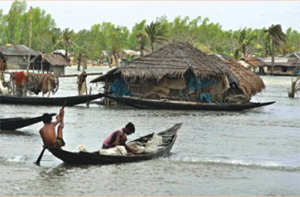Climate-hit countries count on their promises as Durban meet gets underway
 As the stories emerging from Africa to Americas, Asia to Australia tell the same grave situation of ever increasing drought, floods, storms and hot spells, a Climate Change Conference began here yesterday with hopes that the rich nations will keep their commitments to extend helps to the poor and that they would themselves pledge to reduce carbon emission.
As the stories emerging from Africa to Americas, Asia to Australia tell the same grave situation of ever increasing drought, floods, storms and hot spells, a Climate Change Conference began here yesterday with hopes that the rich nations will keep their commitments to extend helps to the poor and that they would themselves pledge to reduce carbon emission.
As negotiations will roll on for the next two weeks, the key focus will be on breathing a new life to Kyoto Protocol, the only legally binding treaty to cut greenhouse gas, through agreeing to a second commitment period after 2012. The first commitment period mainly agreed by the European Union will expire next year.
The fate of Kyoto Protocol now mainly depends on whether the United States agrees to cut its emission. If the US does not agree, the whole thing is likely to fall through as other rich countries including the EU might step back. EU that contributes barely 11 percent of the greenhouse gas said it might renew its commitment for a second time. But that remains a big ‘might’.
The desperation to keep Kyoto alive was also reflected in the opening speech of South African President Jacob Zuma who opened the conference, also known as Conference of Parties (COP), at the International Conference Centre, Durban.
“You have before you the responsibility to re-affirm the multilateral rules-based system anchored by the Kyoto Protocol and to provide the funding needed to address impacts of climate change through activating the Green Climate Fund,” Zuma said.
“The expectation is that you must work towards an outcome that is balanced, fair and credible,” he stated.
The South African president also outlined how severe drought in Somalia is displacing people to Kenya — how scarce grazing land is leading to conflicts in Sudan and how hurricanes are pummeling coasts in the US.
“This meeting is taking place because climate change poses serious risks for humanity, especially in the developing world,” he said. “Climate change can no longer be treated as just an environmental challenge. It is a holistic, sustainable development challenge.”
But a sense of uncertainty prevails among the participants of the conference as nobody knows what will happen after the $30 billion Fast Track Fund timeline ends next year. The issue here is whether the developed world keep on funding the poor nations after 2012.
“We will also sit on the formation of the adaptation committee and technology transfer fund,” said Saleemul Huq, senior fellow of International Institute for Environment and Development. “We have to fix national adaptation plan modalities and look for funds from the rich nations. The rich have agreed to provide adaptation and technology transfer funds. But it is not clear how much they will contribute.”
Although there is a common sense of understanding that the rich nations will contribute their $100 billion to the Global Climate Fund from 2020, an agreement has yet to emerge on the structure of the fund. The transitional committee that was tasked with preparing the structure could only come up with a draft.
Meantime, smaller nations are declaring their own initiatives to cut greenhouse gas probably as a tactic to shame the rich nations.
“The good news coming into negotiations is a “growing momentum for action,” Christiana Figueres, executive secretary of the UN Framework Convention on Climate Change (UNFCCC), said at a press conference on Sunday, pointing to recent actions in nearly 20 countries to reduce carbon pollution.
And the South African president yesterday made it clear that his country is progressing towards reduction of emission by 34 percent in 2020 and by 42 percent in 2025.
“But such efforts are not enough to cap the rising temperature to 1.5 degree Celsius of pre-industrial era,” said Saleem. “We need solid commitment from the rich to reach that level. Or else, many countries will go under water.”
Courtesy of The Daily Star




















